Highlights eco-friendly way of dealing with crop residues by converting them as Biochar to improve soil fertility. Describes how an FPO has made this process a business enterprise for the benefit of all.
Burning of unused crop residue is a common practice among farmers in India. It is not an eco-friendly method. It contributes to increasing the atmospheric carbon dioxide by polluting the air. Also, farmers have reduced use of organic fertilizers. They have started using chemical fertilizers resulting in the depletion of soil carbon content. It has also resulted in reduced water holding capacity, infiltration rate, drainage capacity, microbial population, and enzymatic activity of soils. This is a serious environmental problem in the Yavatmal district of Maharashtra, where 405,000 ha of cotton and 106,000 ha of pigeon pea are grown annually.
| Biochar, a rich source of carbon increases the carbon content in the soil, increases the water and nutrient holding capacity of soil. Application of biochar increases the microbial population, enzymatic activity and soil fertility. Biochar application also increases the disease and drought resistance of the crop. |
To address these twin issues of increased air pollution as well as depleting soil fertility, BAIF Development Research Foundation, Pune based NGO working in rural development introduced the Biochar production and its application for soil improvement as a production enterprise. The enterprise uses the crop residues as raw materials and the farmers can use Biochar, the end product, to improve their soils and crop yields. Besides the use of Biochar, BAIF promoted soil testing-based application of fertilizers, use of organic pesticides, improved agronomic practices, soil and water conservation practices and use of vermicompost for sustainable soil health management.
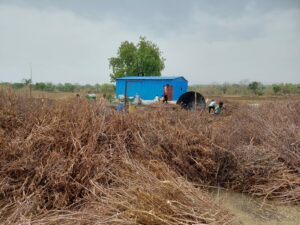
Biochar production unit
Farmers, however, had constraints in taking up the Biochar enterprise owing to lack of knowledge on Biochar production technology; inability of farmers to purchase the Kiln and other production equipment and difficulty in managing labour requirements which individual farmers could not afford.
To address these issues, BAIF with the support of GIZ formed a Farmers Producer Organization (FPO), namely, TULJA Farmer Producer Company at Yavatmal district of Maharashtra in 2019. The number of members is 220 with a share value of INR 1000 by each member. As the area under Cotton in Yavatmal and Amravati district is high, the crop residue burning is a common but hazardous practice practiced by farmers once they harvest the crop. Taking this as a potential opportunity, FPO organized several meetings to sensitize farming communities on the hazards of burning the residues. Similarly, one of the topics was use of Biochar for improving soil productivity. These events were organized at farmers field, at demonstration plots and during farmers schools.
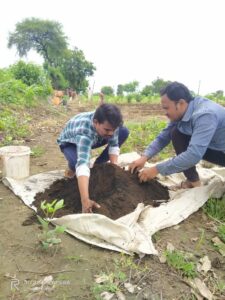
Applying biochar to fields
FPO started purchasing the cotton crop residue from January 2021. It started with a prefixed price at Rs. 2.5-3.0 per kilogram, which attracted farmers to sell their residue to the FPO. Otherwise, they were burning crop residues in the open. The collected residue was processed in the form of Biochar through pyrolysis process using Kilns. The Kilns used for the pyrolysis process (size – 200 Kg) costed around Rs. 60000. Further, the Biochar is converted into fine powder form and is packed in gunny bags. The Biochar is sold to the farmer members at a discounted rate (around Rs.2-3/kg less than the market rate).
In the year 2021-22, FPO successfully converted 100 tons of crop residues into 25 tonnes of Biochar.
Results
The biochar making unit run by FPO resulted in creating new opportunities and economic flows between diverse stakeholders – Farmers could sell cotton crop residues; Labour was required for cotton residue collection and biochar production; the Transporter was required to carry the residue to the processing centre; finally, farmers served as buyers of biochar for use in their crops.
Farmers started earning from selling farm wastes rather than spending money on land cleaning operations. The enterprise created new employment opportunities for skilled and unsklilled labour. There were two types of unskilled labour required – at farmers field – to collect crop residue and transport, and at FPO – for loading as well as helping in the production. The skilled or semi-skilled workforce got involved in the biochar production operation to exercise caution while handling crushing and packaging operations. FPO too gets some income by selling the packaged Biochar to its local members. As farmers started using the biochar for improving crop yields, the demand for Biochar increased.
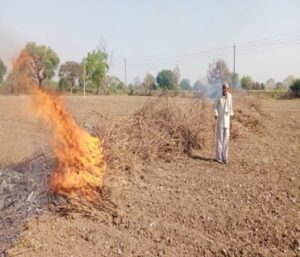
Crop residues as raw material for biochar production
Gradually, FPO expanded its operations. From November 2022, the FPO, besides producing Biochar under ProSoil Project, set up Dal Processing unit. All these operations contributed to the circular economy of the region as depicted in Figure 1. Farmers, thus got benefitted directly as well as indirectly by working collectively.
Farmers have started using the Biochar on their own. As some of the benefits of the biochar application can be realised in the long term, the cost of application is broken down on the years and it is considered as an investment instead of the cost. The famers compensate the cost of Biochar application with the reduced rate of fertilizer application. Biochar manages nutrient release optimally for the crop during various stages of growth. Some of the farmers found it expensive to apply the Biochar as the land holding is high. However, they are ready to use, if support is provided.
The farmers have reported application of 2.5 tonnes/ha. in crops such as Soyabean, Cotton, Tur and others. The Biochar has been applied at the time of the land preparation. Crop yields observed at farmers field research trials at different seasons is as follows: Rabi 2020 –12.59% in wheat (12 Plots);13.44% in gram (08 Plots); Kharif 2021:12.16% in Cotton (20 Plots);7.04 in Soyabean (6 Plots); Rabi 2021:13.68 % in wheat (12 Plots); 13.07% in gram (8 Plots). Farmers have also indicated improvement in yields on their farms. Farmers from neighbouring villages have visited the application site and witnessed the results as the demonstration plots were established with the control plots in the same field.
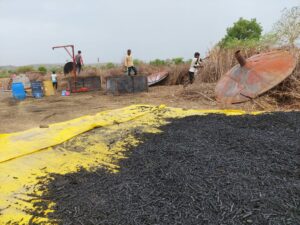
Biochar enterprise created new employment opportunities
Way Forward
Farmers need to be provided with support for some time to make them realise the benefits of the Biochar use. There is need for support for marketing of the Biochar produced by FPO by further enhancing the demand to institutions involved. Also, the Biochar production mechanisms needs to standardised to reduce the cost of production. Additional financial support is needed for expansion of FPO’s services with addition of multi processing units.
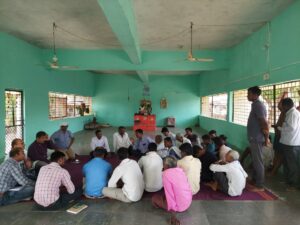
An interactive session with farmers
Ganesh R Bedare
Associate Thematic Programme Executive
BAIF Development Research Foundation
BAIF Bhavan, Dr. Manibhai Desai Nagar, Warje, Pune – 411058
Office: +91-20-25231661-9 | Mob: +91 9860131646,
ganeshb@baif.org.in – www.baif.org.in









